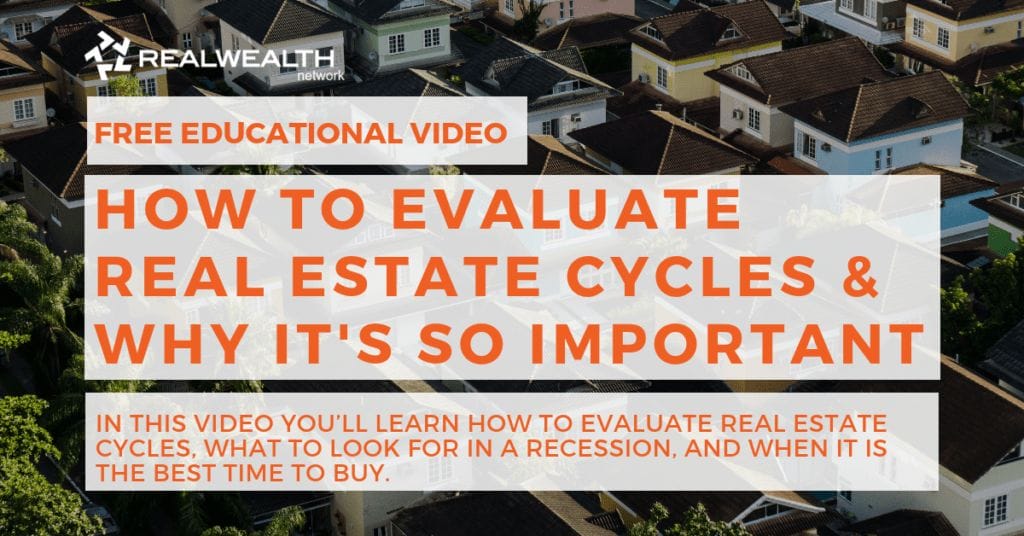How To Evaluate Real Estate Cycles – Videos
Part 1
Part 2
Video Transcripts
Part 1
Kathy Fettke: I’m here today to talk about real estate market stages and cycles so you’re getting the right information. Study this and learn this graphic here [See Video: 00:15] because this is how it cycles, and it cycles about every 10 years and so how could we not notice? If it keeps happening every 10 years, why on earth are economists missing it over and over again? I don’t know, it just seems like there’s something bigger at play here but this is how it works.
long term investing
There are highs and lows. Let’s talk about the process of how we get to that crazy high. There’s usually a recession that precedes it, we’ll talk about why. Then at the bottom, things just start to get ridiculous, everybody freaks out, they don’t want what’s on sale anymore, and they’re sick of taking the losses.
At some point, there’s an overcorrection. People come in and say, “Wait a minute, these prices are too good to be true. How can buy this property for much cheaper than it is to rent,” or “This is 25% of the value, so it cost more to build this property than the sale price.” Whatever the reason, smart investors come in and realize there are deals and they start buying like crazy. This would be 2009, 2010 depending on the market, even today, we’re at this point in certain markets.
Those investors buy properties and scoop up the best deals. When all the good deals are gone, prices start to go up. This is mostly because the cheap stuff has gone not necessarily because prices have gone up.
But, people think prices are going up and so they start to jump in slowly and then we start to see recovery. When recovery begins and prices increase, builders start to think, “Wow, it might make sense to start building because our prices are going up and land is cheap.” So right around here [See Video: 02:17] this is when new construction starts again because prices are high enough that they can make money.
Then the builders get a little greedy. A lot of times, builders are getting paid to build. They get the construction funds and that’s how they can make their money. They don’t necessarily want to know when this happens because it cuts severely into their paycheck.
Oftentimes, when the builders come in, they build, build, build, and expansion happens. Then everybody goes back to thinking, “This is never going to end, this is awesome, we’re all going to keep making money,” but bam, something happens that stops the music.
That’s what we’re going to talk about today. What is it that stops the music? Certainly, in 2006, it was oversupply, too many builders were building all over the place. They were even building two or three hours from job markets. Then affordability went crazy, you can’t pay more for housing than you earn.
Unfortunately, when I was a mortgage broker at that time, I would see that happening. People would come to me and say, “Well, I can qualify for this loan on a starter rate.” But then, I would say to them, “Yes, you can qualify right now but that’s a starter rate, your payment is going to go up next year.” “Oh, that’s all right, the home price will go up.” That was people’s thinking.
People literally couldn’t afford the payment when the payment would adjust and, if their mortgage broker told them or if they had read their loan docs, they knew that going into it.
Bam, those payments adjusted, and people couldn’t afford their loan payments. Foreclosures happened, more foreclosures, then fear stepped in and it was a free for all.
It was a really great opportunity for us at RealWealth, and for the bottom feeders, it was an incredible opportunity. I was on the radio constantly saying, “Are you kidding? This is not a time to be fearful, this is the time to build tremendous wealth.”
Part 2
Kathy Fettke: First, let’s just take a look at 2006 and what you were doing then. Were you just enjoying life? It was a time of great prosperity. Anyone could buy homes. People were very proud of their new homes. People were investing in property. It was just booming. It was good times.
I know for Rich and I, I had listened to a report and we were aggressively telling people to sell their California property because we saw it as overpriced. We had no idea what really was around the corner, but we knew the fundamentals, and it just didn’t make sense.People could not afford the properties that I was putting them in. I was a lone broker and just kind of scratching my head looking at the current going, “You know when this payment adjusts, it’s more than you make.”
That’s what we were doing, and then I didn’t listen to my own advice. I had a read a report about the East Bay being the economic engine for the Bay Area, and I wanted to move my kids into a really good school district. We bought a house in that area. A million-dollar teardown, fixer-upper. I decided to keep the old house just down the street because of this research that the East Bay was really booming.
But, there was trouble ahead. In 2008, when those two properties in Lafayette maybe were worth about half of what they were a few years earlier it was no fun at all. Just take a moment because it’s so easy to forget just 10 years ago what you were doing, the decisions you were making, and the results of those decisions just a few years later.
Now, some of you are going to be hugging yourself and congratulating yourself saying, “I sold my property and I bought in Texas,” or “I cashed out,” or “I held.” Whatever it was. You may be very happy with the choices you made in 2006. Others of you did what I did and got lost in the excitement of the time. Even though I had data information I was sharing with everybody else, I didn’t listen to it myself. Irrational exuberance is what it’s called, just believing that things are going to be good forever, just like we believe things are going to be bad forever in a slump.
The truth is that recessions happen, and they happen regularly. It’s just basically a decline in economic activity that can result in layoffs. Depending on how you look at a recession, it can be terrifying, or it can be a really good thing. If you’re going to be getting laid off, it can be terrifying unless it’s time for a new job for you and a new career. If you are looking to do different things like acquire assets for cheap, then a recession is beautiful. This is the time when you can make the most money during a recession.
As a business owner, there are great benefits to recessions as well, because you can hire people for less per hour. There are benefits either way you look at it. A recession is a normal part of the business cycle and it’s happened on average every five years since World War II. Some of those recessions are very mild, and we barely feel them. Unless you lose your job, you feel it a lot, but the economy, in general, doesn’t react that heavily to these recessions. But, sometimes they cut deep as we saw just eight years ago.
Now, the current expansion is more than six years old and so we’re due for another recession. It shouldn’t be that surprising. What is surprising is how quickly we forget. Recessions are regular things that happen all the time, it’s part of economics.
A recession is generally defined as two consecutive orders of contraction. The great recession started in December of 2007. A year later, the Dow have fallen roughly 40% and over 3.5 million workers lost their jobs.
A recession can be something that we don’t find out we’re in until it’s too late. That’s why I’m writing a book and why I’m holding this webinar now, I don’t want anybody finding out too late. I want everyone to know what’s ahead so they can make the right decisions and be prepared for what could be in the horizon.
When I was doing a little search to look at home prices, this is the Google search that came up [05:14]. First, I just put “Home prices 2006,” and saw, “Home prices surpassing peak,” “Strongest Levels,” “Record Highs.” Then next three posts, “Sales fall the most in 17 years,” “Home sales tumble,” “Deep slump.” All in just one Google search. That’s how quickly it happened.
What would you do differently if you thought a recession might be coming? Even further, what would you do differently if you and I were sitting here having this conversation in 2006? If somebody sat you down and showed you what might be coming, what would you have done differently? I’ll tell you what, we would have sold that house and not bought the million-dollar fixer upper. We would have sold our Lafayette house, or just kept it and held it, because we know markets cycle and markets are going to come back. The decisions you make at the peak can really affect you, and the decisions you make at the trough can make you wealthy forever. It is really valuable to get good at predicting these cycles.
Let’s turn to the housing market, because this is what probably you and I care about the most, as this is where a lot of us are invested. The traditional housing indicators that most people look at are not so much projecting, but looking more at what’s happened. Indicators include, looking at how long it’s taking to sell properties days on market. Also, looking for prices, increasing or decreasing. You can look at price to rent ratios and certainly affordability also.
That was the problem in 2006 as California’s affordability was so out of whack. I didn’t think there was going to be such a huge economic meltdown. I did know that California was way off in affordability, and I knew that prices were high and that’s why we were aggressively advising people to sell in 2006. We encouraged people to get out of California and exchange overpriced properties for areas where housing was undervalued but where jobs were abundant. Affordability is a big one.
Other things to look at, interest rates, a lot of people watched the interest rates to see if it affected housing. Inventory levels, of course, how much is out there in the market, supply/demand stuff. Finally, keep an eye on notice of defaults.
Again, this is all reactive, not so much proactive, but it can give you a good idea of what’s happening. Market cycles tend to go one way, and please don’t think that it’s any other way. It has always been the same, but people seem to think it will keep going up every single time. That’s just not sustainable.
Human psychology is fascinating, when we get in this ecstatic mode and then, suddenly, there is a drop. We look back when we’re down and go, “Oh, yes. Now, I totally see it.” We couldn’t see it then, but when the economy is down everybody’s freaking out saying, “I’m not buying anything.” Then as the market recovers you’re up and you go, “Oh, yes, all the signs were there. Of course, I should’ve bought back then.” Again, hindsight is 20/20 but how can you be more proactive in seeing this stuff coming.
A lot of this is in my book, Retire Rich with Rentals, but what generally are we seeing in a high? How can we predict that we’re in a high? It’s that irrational exuberance. It’s when everybody thinks that things couldn’t get better and lots of building is happening.
How can we tell what’s coming? How do we know we’re at the peak and how do we know we’re at the trough? At the peak, we see a lack of affordability. We see builders come in and there are many cases oversupply. The key factor is that affordability is out of whack and I think in a lot of parts in the country we’re seeing that now. When affordability is out of whack and suddenly people can’t afford properties, maybe because there’s a recession or job losses, bubbles bursting, whatever the reason, we see values go down.
How do you know at which point is time to buy? I went over this in my book and it was tough. I don’t think anyone has really got this down, but we’re all trying to figure it out. One of the best times to buy, in my opinion, is right here, when the economy is in a recession headed towards the trough [10:08]. Everyone is still scared to do anything, and vacancies are increasing. There’s no new construction and everybody’s afraid, but because everybody’s afraid, this is a beautiful time to buy.
Now, is it a good time to buy during recovery? Sure. You can get some good deals on that side of it too. You don’t have to go through this part but once the word is out, you’re just not going to get as good of deals. For example in Riverside California, you could buy homes just before the trough for around $65,000. It was just amazing and people were buying. Once you get over into recovery they were going up to $85,000, $90,000, $100,000. It’s still a good deal, not as good as it could have been.
If you’re going to buy right before the trough you just have to know that prices might still continue to decline. You need to be able to hold on to that property and hopefully have it cash flowing. If you’re renting the property out when home values go up, they go up and it doesn’t really matter either way.
Recovery is still a good time for builders to get in because values are up and they could start selling.Then they’re really able to sell up when the economy starts growing again, in expansion mode. During that time there will be lots of new construction, declining vacancies, lack of supply, more building until we get to that peak of affordability issues and inflated bubbles that pop and bam, there we go again.



